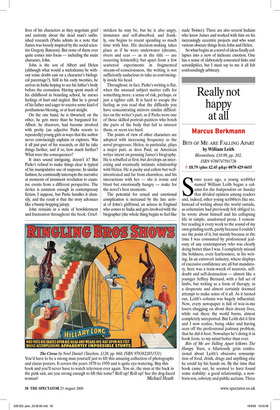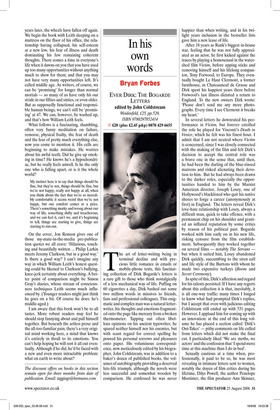Really not happy at all
Marcus Berkmann
BITS OF ME ARE FALLING APART by William Leith Bloomsbury, £10.99, pp. 202, ISBN 9780747591726 ✆ £8.79 (plus £2.45 p&p) 0870 429 6655 Some years ago, a young scribbler named William Leith began a column for the Independent on Sunday that divided opinion among readers and, indeed, other young scribblers like me. Instead of writing about the world outside, as columnists had previously felt obliged to, he wrote about himself and his collapsing life in simple, unadorned prose. I remember reading it every week to the sound of my own grinding teeth, partly because I couldn’t see the point of it, but mainly because at the time I was consumed by professional jealousy of any contemporary who was clearly doing better than I was. I completely missed the boldness, even fearlessness, in his writing. In an extrovert industry, where displays of excessive confidence are all but mandatory, here was a train-wreck of neurosis, selfdoubt and self-destruction — almost like a younger Jeffrey Bernard, with a full set of limbs, but writing as a form of therapy, in a desperate and almost certainly doomed attempt to make sense of it all. As it turned out, Leith’s column was hugely influential. Now, every newspaper is full of woe-is-me losers chugging on about their dreary lives, while out there the world burns, almost completely unreported. But Leith did it first and I now realise, being older and having seen off the professional jealousy problem, that he did it best. Nowadays he’s doing it in book form, to my mind better than ever.
Bits of Me are Falling Apart follows The Hungry Years, a hilariously grim confessional about Leith’s obsessive consumption of food, drink, drugs and anything else he could lay his hands on. By the time that book came out, he seemed to have found some stability: a good relationship, a newborn son, sobriety and public acclaim. Three years later, the wheels have fallen off again. We begin the book with Leith sleeping on a mattress on the floor of his office, the relationship having collapsed, his self-esteem at a new low, his fear of illness and death dominating his few remaining coherent thoughts. There comes a time in everyone’s life when it dawns on you that you have used up too many opportunities without anything much to show for them; and that you may not have very many opportunities left. It’s called middle age. As writers, of course, we can be ‘promising’ for longer than normal mortals — so many of us have only hit our stride in our fifties and sixties, or even older. But as supposedly functional and responsible human beings, we can’t still be ‘promising’ at 47. We can, however, be washed up, and that’s how William Leith feels.
What follows is a fascinating, shambling, often very funny meditation on failure, remorse, physical frailty, the fear of death and the fear of pretty much everything else, now you come to mention it. His cells are beginning to make mistakes. He worries about his awful teeth. Did he give up smoking in time? He knows he’s a hypochondriac, but he really feels unwell. Is he the only one who is falling apart, or is it the whole world?
My instinct here is to say that things should be fine, but they’re not, things should be fine, but we’re not happy, really not happy at all, when you think about the fact that we’re so incredibly comfortable it seems weird that we’re not happy, but our comfort comes at a price. There’s something murky and wrong about our way of life, something shifty and treacherous, and we can feel it, can’t we, and it’s beginning to tell, things are starting to give, things are starting to run out.
On the cover, Jon Ronson gives one of those my-mate-in-the-media pre-publication quotes we all crave: ‘Hilarious, touching and beautifully written ... Philip Larkin meets Jeremy Clarkson, but in a good way.’ Is there a good way? I can’t imagine any way in which William Leith’s honest questing could be likened to Clarkson’s bullying, knee-jerk certainty about everything. A better point of comparison might be Simon Gray’s diaries, whose stream of consciousness techniques Leith seems much influenced by. (Younger readers might just think he goes on a bit. Of course he does: he’s middle-aged.) I am aware that this book won’t be to all tastes. More robust readers may feel he should stop fannying about and pull himself together. But beneath the artless prose and the all-too-familiar pain, there’s a very original mind working here, a mind that knows it’s entirely in thrall to its emotions. You can’t help hoping he will sort it all out eventually. Although if he did, he’d be faced with a new and even more intractable problem: what on earth to write about?



























































 Previous page
Previous page